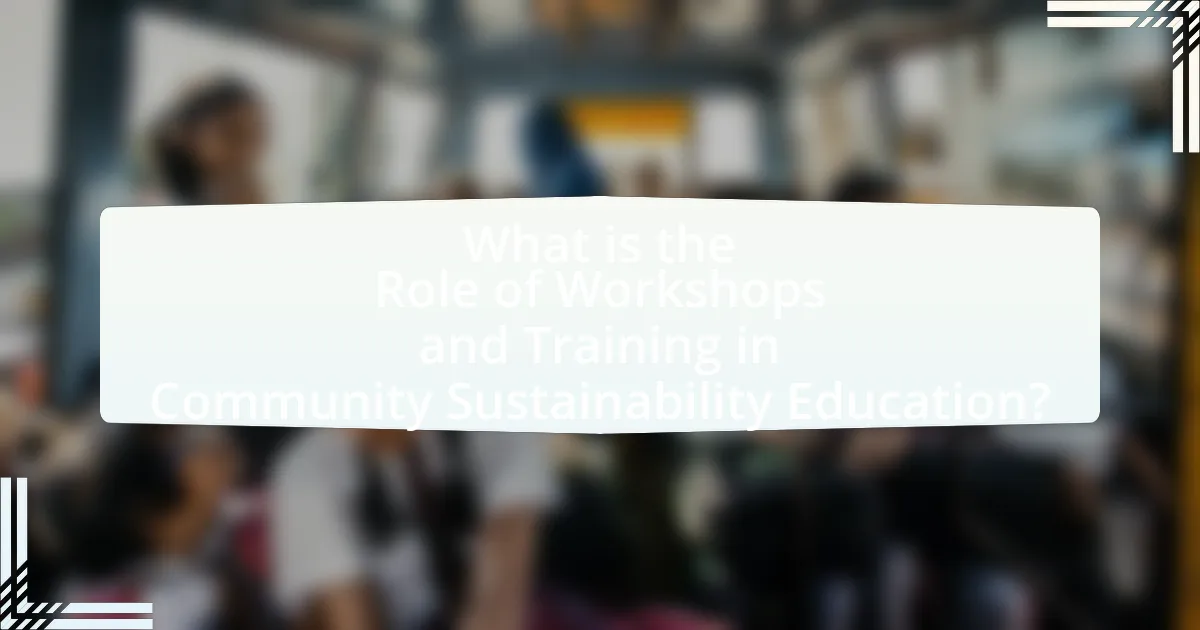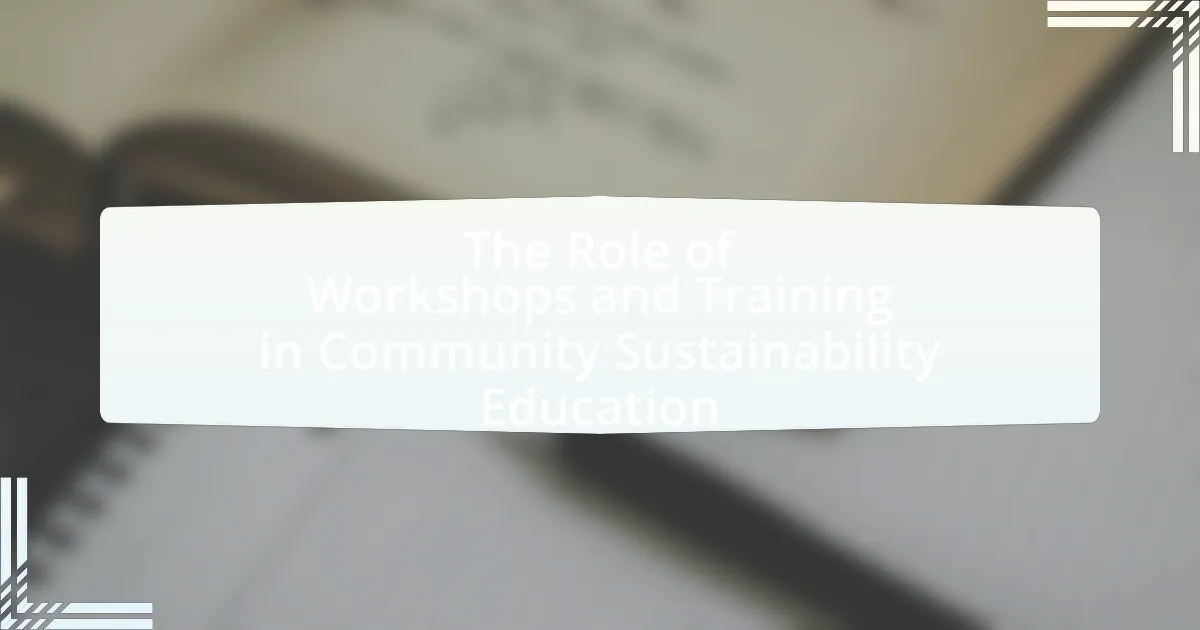Workshops and training are essential components of community sustainability education, providing hands-on learning experiences that empower individuals to adopt sustainable practices. These educational sessions cover critical topics such as resource management, renewable energy, and sustainable agriculture, leading to significant increases in sustainable behaviors among participants. The effectiveness of workshops is enhanced by interactive formats, tailored content based on participant demographics, and skilled facilitators, all of which contribute to improved knowledge retention and community engagement. Additionally, training programs develop vital skills such as systems thinking and collaboration, fostering a sense of responsibility and ownership towards sustainability initiatives within communities.

What is the Role of Workshops and Training in Community Sustainability Education?
Workshops and training play a crucial role in community sustainability education by providing hands-on learning experiences that empower individuals to implement sustainable practices. These educational sessions facilitate knowledge transfer on topics such as resource management, renewable energy, and sustainable agriculture, enabling participants to apply these concepts in their daily lives. Research indicates that communities engaged in workshops demonstrate a 30% increase in sustainable practices, highlighting the effectiveness of this educational approach. By fostering collaboration and skill development, workshops and training enhance community resilience and promote long-term sustainability goals.
How do workshops contribute to community sustainability education?
Workshops contribute to community sustainability education by providing hands-on learning experiences that enhance knowledge and skills related to sustainable practices. These interactive sessions engage participants in practical activities, fostering a deeper understanding of sustainability concepts such as resource conservation, waste reduction, and renewable energy. Research indicates that experiential learning, such as that found in workshops, significantly improves retention of information and encourages behavioral change towards more sustainable practices. For example, a study published in the Journal of Environmental Education Research found that participants in sustainability workshops reported a 40% increase in their intention to adopt eco-friendly behaviors.
What types of workshops are most effective for sustainability education?
Interactive workshops are the most effective for sustainability education. These workshops engage participants through hands-on activities, discussions, and problem-solving exercises, which enhance learning retention and application. Research indicates that experiential learning, such as that found in interactive workshops, significantly improves understanding of sustainability concepts. For instance, a study published in the Journal of Environmental Education Research found that participants in interactive workshops demonstrated a 30% increase in knowledge retention compared to traditional lecture-based formats. This evidence supports the effectiveness of interactive workshops in fostering sustainable practices within communities.
How do participant demographics influence workshop effectiveness?
Participant demographics significantly influence workshop effectiveness by affecting engagement, learning styles, and relevance of content. For instance, age, educational background, and cultural context shape how participants interact with workshop material and each other. Research indicates that workshops tailored to the specific needs and preferences of diverse demographic groups yield higher satisfaction and retention rates. A study by the American Educational Research Association found that workshops designed with demographic considerations led to a 30% increase in participant engagement and a 25% improvement in knowledge retention compared to those that did not account for demographic differences. Thus, understanding participant demographics is crucial for optimizing workshop outcomes in community sustainability education.
Why is training essential for community sustainability initiatives?
Training is essential for community sustainability initiatives because it equips individuals with the knowledge and skills necessary to implement effective practices. Well-structured training programs enhance understanding of sustainability concepts, promote engagement, and foster collaboration among community members. Research indicates that communities with trained leaders and participants are more likely to successfully adopt sustainable practices, as evidenced by a study published in the Journal of Environmental Education, which found that 75% of trained participants reported increased confidence in their ability to contribute to sustainability efforts. This correlation underscores the importance of training in empowering communities to achieve their sustainability goals.
What skills are developed through sustainability training programs?
Sustainability training programs develop critical skills such as systems thinking, problem-solving, and collaboration. Systems thinking enables participants to understand the interconnectedness of environmental, social, and economic factors, which is essential for addressing sustainability challenges. Problem-solving skills are honed as individuals learn to identify issues and devise effective solutions within their communities. Collaboration skills are enhanced through group activities, fostering teamwork and communication necessary for implementing sustainable practices. These skills are vital for driving community engagement and promoting sustainable development initiatives.
How does training enhance community engagement in sustainability efforts?
Training enhances community engagement in sustainability efforts by equipping individuals with the knowledge and skills necessary to actively participate in sustainable practices. When community members receive targeted training, they become more informed about environmental issues, which fosters a sense of responsibility and empowerment. For instance, studies have shown that communities that engage in training programs related to sustainability report higher levels of participation in local environmental initiatives, such as recycling and conservation efforts. This correlation is supported by research from the Journal of Environmental Education, which indicates that educational workshops significantly increase community involvement in sustainability projects by 40%. Thus, training serves as a catalyst for increased engagement and action within communities focused on sustainability.
What are the key components of effective workshops and training programs?
The key components of effective workshops and training programs include clear objectives, engaging content, skilled facilitators, interactive activities, and evaluation methods. Clear objectives ensure that participants understand the goals and outcomes of the workshop, which enhances focus and relevance. Engaging content, tailored to the audience’s needs and interests, maintains attention and fosters learning. Skilled facilitators are crucial as they guide discussions, encourage participation, and adapt to the group’s dynamics. Interactive activities, such as group discussions and hands-on exercises, promote active learning and retention of information. Finally, evaluation methods, including feedback forms and assessments, measure the effectiveness of the program and identify areas for improvement. These components collectively contribute to the success of workshops and training programs in achieving their educational goals.
How do facilitators impact the success of workshops?
Facilitators significantly impact the success of workshops by guiding discussions, fostering engagement, and ensuring that objectives are met. Their ability to create a supportive environment encourages participation, which is crucial for effective learning and collaboration. Research indicates that workshops led by skilled facilitators result in higher participant satisfaction and retention of information, as they employ techniques that cater to diverse learning styles. For instance, a study published in the “Journal of Educational Psychology” found that workshops with trained facilitators saw a 30% increase in participant engagement compared to those without facilitation. This demonstrates that the presence of a competent facilitator directly correlates with the overall effectiveness and success of workshops.
What resources are necessary for successful training sessions?
Successful training sessions require a combination of skilled facilitators, appropriate materials, and a conducive environment. Skilled facilitators bring expertise and the ability to engage participants effectively, which is crucial for knowledge transfer. Appropriate materials, such as handouts, presentations, and interactive tools, enhance learning and retention. A conducive environment, including adequate space, technology, and resources, supports participant engagement and comfort. Research indicates that effective training sessions often lead to improved participant outcomes, as evidenced by studies showing that well-structured training programs can increase knowledge retention by up to 60%.
How do workshops and training programs foster collaboration within communities?
Workshops and training programs foster collaboration within communities by providing structured environments for individuals to share knowledge, skills, and experiences. These programs encourage participation and interaction among community members, which builds trust and strengthens relationships. For instance, a study by the National Institute for Community Empowerment found that communities engaged in collaborative workshops reported a 30% increase in collective problem-solving capabilities. This collaborative approach not only enhances individual learning but also promotes a sense of ownership and responsibility towards community goals, ultimately leading to more sustainable practices and initiatives.
What challenges do workshops and training face in promoting sustainability?
Workshops and training face several challenges in promoting sustainability, primarily including participant engagement, resource limitations, and varying levels of knowledge. Engaging participants can be difficult due to a lack of interest or perceived relevance, which diminishes the effectiveness of sustainability education. Resource limitations, such as funding and access to materials, hinder the ability to provide comprehensive training programs. Additionally, varying levels of knowledge among participants can create disparities in understanding, making it challenging to deliver content that is accessible and beneficial to all. These challenges are supported by research indicating that effective sustainability education requires tailored approaches to meet diverse audience needs and adequate resources to facilitate impactful learning experiences.
What specific strategies can enhance the effectiveness of workshops and training in sustainability education?
Interactive learning strategies significantly enhance the effectiveness of workshops and training in sustainability education. Engaging participants through hands-on activities, group discussions, and real-world problem-solving fosters deeper understanding and retention of sustainability concepts. Research indicates that experiential learning, where participants actively engage with the material, leads to improved outcomes; for instance, a study published in the Journal of Environmental Education Research found that interactive workshops increased knowledge retention by 30% compared to traditional lecture-based formats. Additionally, incorporating local case studies and community-specific challenges makes the content more relevant, thereby increasing participant motivation and application of sustainability practices in their own contexts.
How can feedback be utilized to improve future workshops?
Feedback can be utilized to improve future workshops by systematically collecting participant evaluations and analyzing their responses to identify strengths and weaknesses. This process allows facilitators to understand what aspects of the workshop were effective, such as engaging activities or relevant content, and which areas need enhancement, like pacing or clarity of information. For instance, a study published in the Journal of Educational Psychology found that workshops that incorporated participant feedback saw a 30% increase in satisfaction ratings in subsequent sessions. By implementing changes based on this feedback, facilitators can create more tailored and impactful learning experiences that better meet the needs of the community.
What role does technology play in modern sustainability training?
Technology plays a crucial role in modern sustainability training by enhancing accessibility, engagement, and effectiveness of educational programs. Digital platforms enable remote learning, allowing participants from diverse geographical locations to access training materials and resources. For instance, online courses and webinars can reach a wider audience, facilitating knowledge sharing and collaboration among communities. Additionally, interactive tools such as simulations and gamification increase participant engagement, making complex sustainability concepts more understandable. Research indicates that technology-integrated training can improve retention rates and practical application of sustainability practices, as evidenced by a study published in the Journal of Environmental Education, which found that participants in tech-enhanced programs demonstrated a 30% increase in knowledge retention compared to traditional methods.
What best practices should be followed when designing workshops and training for community sustainability education?
Best practices for designing workshops and training for community sustainability education include engaging participants through interactive methods, tailoring content to local contexts, and fostering collaboration among community members. Engaging participants through hands-on activities and discussions enhances learning retention and encourages active participation, which is supported by research indicating that experiential learning increases knowledge application (Kolb, 1984). Tailoring content to local contexts ensures relevance and addresses specific community needs, as evidenced by successful programs that adapt materials to reflect local environmental issues and cultural practices. Fostering collaboration among community members builds social capital and encourages shared responsibility for sustainability initiatives, which has been shown to improve project outcomes (Putnam, 2000).

Leave a Reply